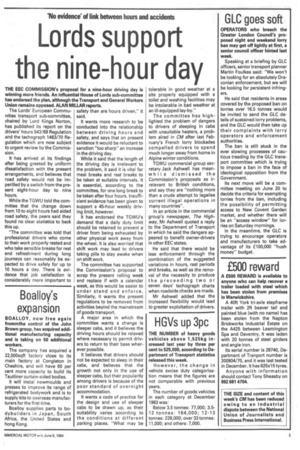Lords support the nine-hour da
Page 5

If you've noticed an error in this article please click here to report it so we can fix it.
THE EEC COMMISSION's proposal for a nine-hour driving day is winning more friends. An influential House of Lords sub-committee has endorsed the plan, although the Transport and General Workers Union remains opposed. ALAN M LIAR reports.
The Lords' European Cornmusafety than are hours driven," it nities transport sub-committee, said.
chaired by Lord Kings Norton, has published its report on the drivers' hours 543/69 Regulation and the tachograph 1463/70 Regulation which are now subject to urgent review by the Commission.
Ithas arrived at its findings after being greeted by uniform dissatisfaction with the present arrangements, and believes that road safety would not be imperilled by a switch from the present eight-hour day to nine hours.
While the TGWU told the committee that the change down from 10 to eight hours had aided road safety, the peers said they found no clear statistics to back this up.
"The committee was told that professional drivers who come to their work properly rested and who take sensible breaks for rest and refreshment during long journeys can reasonably be expected to drive safely for up to 10 hours a day. There is evidence that job satisfaction is considerably more important to It wants more research to be conducted into the relationship between driving hours and safety, and says that on present evidence it would be reluctant to sanction "too sharp" an increase in the driving day.
While it said that the length of the driving day is irrelevant to the problem, it said it is vital for meal breaks and rest breaks to be taken at suitable intervals. It is essential, according to the committee, for one long break to be taken after four hours. Insufficient evidence has been given to support a 45-hour weekly driving limit, however.
It has endorsed the TGWU's demand that a daily duty limit should be retained to prevent a driver from being exhausted by other physical work away from the wheel. It is also worried that shift work may lead to drivers taking pills to stay awake when on shift work.
The committee has supported the Commission's proposal to scrap the present rolling week and replace if with a calendar week, as this would be easier to under stand and enforce. Similarly, it wants the present regulations to be removed from activities beyind the mainstream of goods transport.
A major area in which the committee wants a change is sleeper cabs, and it believes the driving hours should be relaxed where necessary to permit drivers to return to their base wherever possible.
It believes that drivers should not be expected to sleep in their cabs, and believes that the growth not only in the use of sleeper cabs, but their popularity among drivers is because of the poor standard of overnight accommodation.
It wants a code of practice for the design and use of sleeper cabs to be drawn up, as their suitability varies according to the conditions at different parking places. "What may be tolerable in good weather at a site properly equipped with a toilet and washing facilities may be intolerable in bad weather at an ill-equipped lay-by."
The committee has highlighted the problem of dangers to drivers of sleeping in cabs with unsuitable heaters, a problem aired in CM after last February's French lorry blockades compelled drivers to spend much longer away from home in Alpine winter conditions.
TGWU commercial group secretary Jack Ashwell has meanwhile dismissed the Commission's proposals as irrelevant to British conditions, and say they are "nothing more than a crude attempt to legalise current illegal operations in many countries".
In an article in the commercial group's newspaper, The Highway, Mr Ashwell quoted a reply to the Department of Transport in which he said the dangers appeared to benefit owner-drivers in other EEC states.
He said that there would be less enforcement through the combination of the suggested variations in hours, rest periods and breaks, as well as the removal of the necessity to produce the preceeding two or seven days' tachograph charts when roadside checks are made.
Mr Ashwell added that the increased flexibility would lead to greater exploitation of drivers.
























































































